Federal stranglehold tops AMA dialogue
Lengthy permitting, EPA 'raids' in Chicken, Pebble beleaguer Alaska miners in 2013; Capitol Hill takes notice of 'poster-child'
Last updated 11/24/2013 at Noon
ANCHORAGE - "Mining in Alaska: Build it, keep it, grow it" was the theme of the Alaska Miners Association 2013 Convention, but "screwed by the federal government" was an underlying refrain that permeated conversations from chats over coffee to keynote speeches at the annual gathering.
"If there is a poster-child for being screwed by the federal government, Alaska is the one," Rep. Doc Hastings, R-Washington told the mining community during his Nov. 6 opening speech at the convention.
The latest in this series of posters would depict images of a U.S. Environmental Protection Agency-led band of armed agents wearing jackets emblazoned with POLICE descending on family-run placer mines near the community of Chicken, in the Fortymile district of eastern Alaska.
"In the Fortymile district, we had the EPA storm-troopers descend, and it is really something we don't really need from our federal overlord," NovaCopper Inc. President and CEO Rick Van Nieuwenhuyse said during a Nov. 7 luncheon.
While posters portraying EPA bureaucrats pondering a pre-emptive veto of the permits needed to develop the enormous Pebble copper project is less provocative, the precedent set by such a decision on state-owned lands would likely be felt across the nation.
During the banquet that marked the close of the 2013 AMA convention, Pebble was one among a number of Alaska mining projects that Sen. Lisa Murkowski, R-Alaska, listed as being, or has been, hampered by federal overreach.
"Our opportunities, quite honestly, are strangled or stifled by what comes out of Washington D.C.," Alaska's senior senator bluntly stated.
"We have been successful in overcoming many of the obstacles, and I think it is because we know what we have to offer, we know how we can do the job and we believe in our potential here," she added. "But, we have got some things we have to deal with back in Washington (D.C.) and the first comes with how we deal with accessing resources when you have got a broken permitting process."
Hastings kicked off the convention with a similar message.
"We are not, in America, utilizing our natural resources as we should be. In fact, the trend has gone the other way to the point that we are reliant on minerals and energy products we have here in the United States," the Chairman of the House Committee on Natural Resources told the Alaska miners. "I think, in the long run that could be very detrimental to the health of our country and certainly to the health of our economy."
Alaska Department of Natural Resource Deputy Commissioner Ed Fogels said the well-being of the Far North state is particularly vulnerable to federal or state policies that undermine resource development.
"I am not sure if there is any other state that has as much to lose or gain as Alaska does; we are so dependent on resource development in our state," he said in a Nov. 7 address at the AMA convention.
"The more we stop development here, the more we shift development to places that may not have as stringent environmental standards as we do - I don't think anybody does, quite frankly," he added.
EPA storm-troopers
The federal government's seemingly heavy-handed involvement in Alaska mining is not only a hot topic in Anchorage but was the cornerstone of an Oct. 10 U.S. Senate Subcommittee on Energy and Mineral Resources hearing provocatively titled "EPA vs. American Mining Jobs: The Obama Administration's Regulatory Assault on the Economy."
"In Chicken, Alaska, an EPA Swat team of heavily armed and armored agents conducted 'paperwork' inspections on small mining operations, in what appears nothing more than an effort to intimidate and scare hardworking Americans," said Energy and Minerals Chairman Doug Lamborn, R-Colorado, during opening testimonies at the hearing.
Rep. Peter DeFazio, D-Oregon, considers the characterization of the Fortymile EPA Clean Water Act inspections as Swat raids to be hyperbole.
Describing the federal-state environmental task force as armed with holstered sidearms, the ranking member of the House Natural Resources Committee said, "Let's not get overboard here and say somehow that constitutes a Swat team."
"For the gentleman from Oregon, I am going to remind him that he was not there, and there is testimony that they were carrying M-16s and assault shotguns; fully armored; and said police agents. This is a Swat team," retorted Rep. Don Young, R-Alaska.
"You are supposed to be for the little guy; you are for big government," Young added.
During his Oct. 10 testimony before the subcommittee, Fortymile Mining Association President Sheldon Maier described how squads of three-to-seven armed and armored men descended upon 30 mining sites in the Fortymile district and proceeded to conduct inspections and sampling without introducing themselves.
"We consider them raids, it was a serious invasion," Maier said, "This is definitely not professional conduct of a law-enforcement agents."
In response to this show of force, Young introduced House Resolution 3281, a bill that would remove the EPA's criminal enforcement authority, and instead rely upon the law enforcement capabilities of the Federal Bureau of Investigation.
"The EPA-led task force's invasion was an unnecessary intrusion into the lives of Alaska miners, who want simply nothing more than to continue to practice the great Alaska tradition of placer mining. The FBI already has the expertise and authority to investigate federal crimes, and H.R. 3281 would simply ensure that this authority is streamlined in one agency that specializes in law enforcement," said Young.
Undermining credibility
The federal environmental agency also was tasked for its handling of the Pebble copper project in Southwest Alaska during the "EPA vs. American Mining Jobs" hearing.
Rep. Lamborn characterized the Bristol Bay Watershed Assessment - an EPA study to determine the effects large-scale mining would have on the area where Pebble is found - as "an effort to pre-emptively veto mining across a whole region of Alaska."
During a Nov. 7 presentation at the AMA convention, Pebble Partnership Vice President of Public Affairs Mike Heatwole said EPA's handling of the Pebble project creates an air of uncertainty that will affect projects well beyond Southwest Alaska.
"As developers we need a stable process to evaluate our projects. Actions like this cast doubt, not just on the development of Pebble but on any other potential development within the watersheds and frankly across the country," he told the crowd gathered to get an update on the Pebble project.
The ranking member of the House Subcommittee on Energy and Mineral Resources, Rep. Rush Holt, D-New Jersey, contends that, given the significance of the salmon fishery in Bristol Bay, EPA's actions are prudent.
"It is my belief that the Bristol Bay Watershed is too important and too fragile to allow a massive open-pit mine, industrializing the landscape and creating long-term waste management challenges," testified Holt.
"It is why I believe it is appropriate for the EPA to study carefully the impacts of large-scale mining in the region, to see if I am right," he added. "Any efforts to portray the EPA's enforcement as an attack on mining, I think, are misguided."
Lamborn believes that by allowing federal agencies such as the EPA to determine the fate of a project outside of the already stringent permitting process meant to protect the environment would undermine the credibility of the process.
"At the heart of this issue is the lack of confidence in permitting by the federal government," testified . Lamborn. "If, without cause, an agency can retroactively veto issued permits or prospectively veto permits not applied for, then how can any company, contractor or concessionaire have confidence to invest in America when their permit is not worth the paper it is written on?"
Critical and strategic legislation
The record-setting duration of the permitting process in the United States was high among the concerns expressed by Hastings and Murkowski during their respective keynote addresses that opened and closed the AMA convention.
"Permitting delays are the most significant risks to mining projects in the United States," Murkowski said. "We are tied for the worst in the world, along with Papua New Guinea, as the two countries with the most numerous permitting delays. That doesn't happen by accident, in my view, that is intentional. That is an overt act that says, 'we just don't want to encourage it here.'"
Congressman Hasting informed the mining community gathered in Anchorage that the "National Strategic and Critical Minerals Production Act of 2013," a bill aimed at streamlining the permitting process for mineral development while protecting the environmental review process, has gained traction on Capitol Hill.
Introduced by Rep. Mark Amodei, R-Nevada, H.R. 761 would designate any proposed mines that would produce "strategic and critical minerals" as infrastructure projects as described by the Presidential Order, "Improving Performance of Federal Permitting and Review of Infrastructure Projects."
The executive order signed by President Barack Obama in March 2012 is designed to "significantly reduce the aggregate time required to make decisions in the permitting and review of infrastructure projects by the Federal Government, while improving environmental and community outcomes."
Congressman Amodei's bill aims to "enhance government coordination for the permitting process by avoiding duplicative reviews, minimizing paperwork and engaging other agencies and stakeholders early in the process" for strategic and critical mineral projects.
"What it simply says is this: 'During the permitting process, there has to be a decision made within 30 days'," Rep. Hastings summarized during his Nov. 6 presentation at the AMA convention.
The legislation nabbed 57 co-sponsors and passed the House 246-148.
"We have passed it out of the House, and we are waiting for action in the Senate. And, since I am a member of the House, I can say we wait on the Senate a lot," quipped Hastings.
Murkowski introduced a similar piece of legislation, "The Critical Minerals Policy Act of 2013," in the Senate Oct. 29.
This bill, S.B. 1600, targets the revitalization of the United States' critical minerals supply chain by directing the Secretary of the Interior to establish a list of up to 20 minerals critical to the American economy and provides a comprehensive set of policies to address issues associated with their discovery, production, use, and re-use.
"We don't want to be sitting in a situation where the Chinese are making all of the decisions as to what we are going to be manufacturing - how, when and where - because they have access to all the critical minerals," she added. "We have got them here, we just need the ability to develop them."
Alaska's senior senator said she believes S.B. 1600, which is cosponsored by nine Democrats and eight Republicans, has a good chance of gaining traction and getting a vote on the Senate floor.
"We have got to change the dynamic here, in this country, with how we view the importance of minerals to our nation," Murkowski said. "We can't move forward until Washington (D.C.) gets out of our way."
Murkowski rallied Alaska miners' support of the Alaska congressional delegation to push back against an over-reaching federal government.
"When I say we need public comments by the industry, we really do mean it," she told attendees at the AMA banquet.






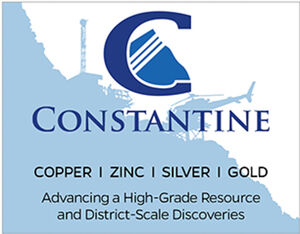
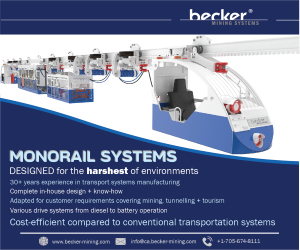
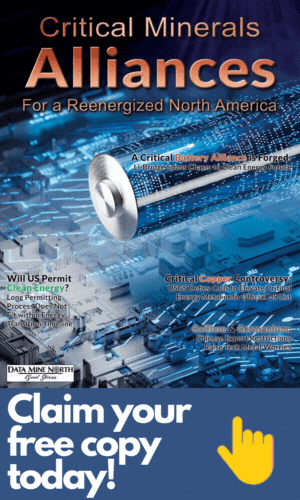



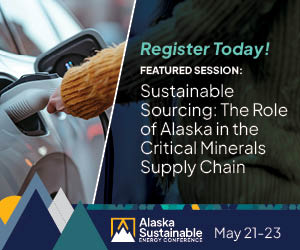
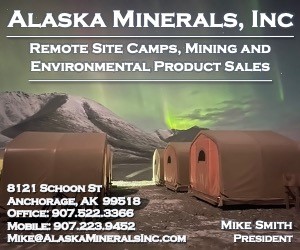


Reader Comments(0)